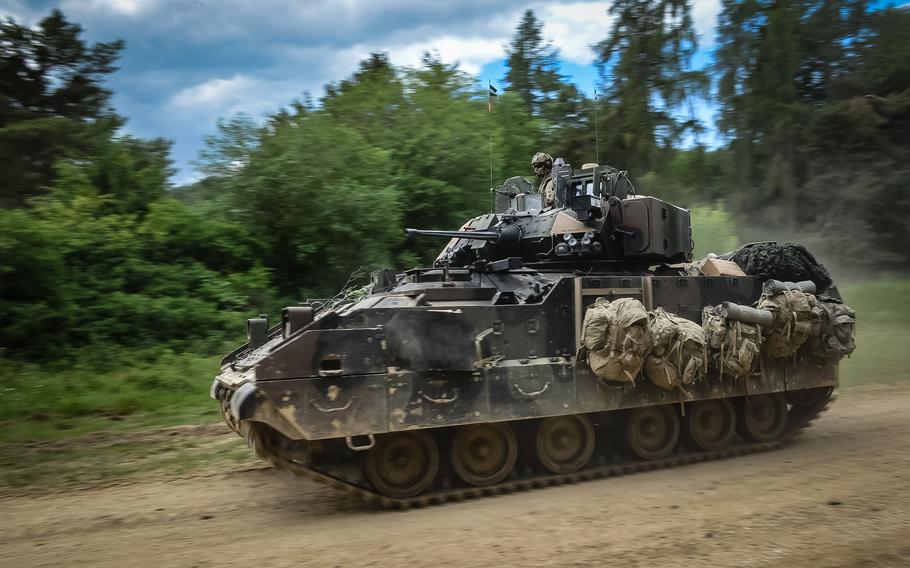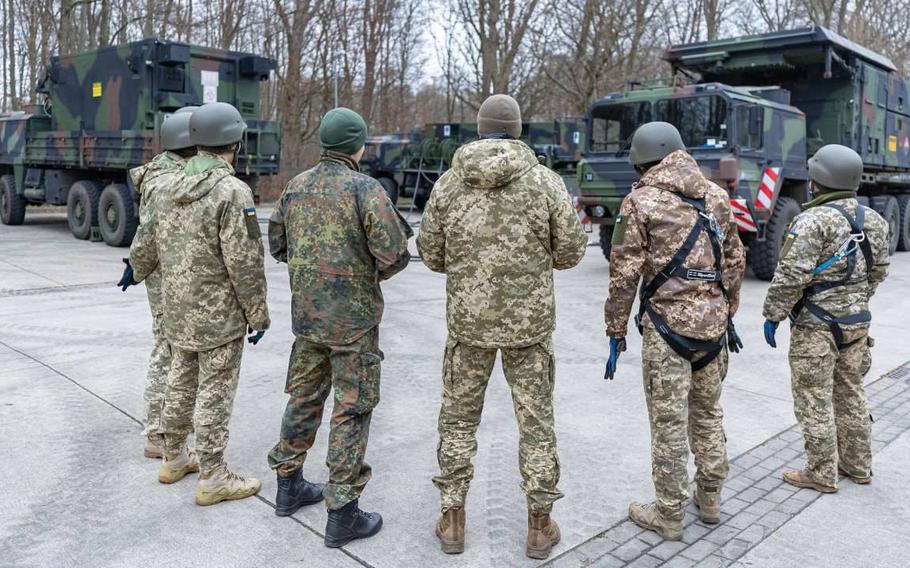JOHN VANDIVER

A year ago, many outside observers said it was only a matter of time until Kyiv’s fall, as Russian soldiers invaded Ukraine in a bid to capture its capital.
Instead, Moscow’s full-scale invasion floundered. Two months into the fighting, Kyiv stood and Russian forces were in retreat.
But hidden amid those failures is a threat still facing the United States military and its allies in Europe, where vulnerabilities persist on its eastern borders, experts say.
“The Russians didn’t get close to capturing Kyiv in three days, but they did capture enough territory equal to the size of Estonia,” retired Lt. Gen. Ben Hodges, the former commander of the U.S. Army in Europe, said in a recent phone interview.
Despite the Kremlin’s battlefield failures and the huge toll in lives and materiel in Ukraine, allies should be careful not to underestimate a Russian military that can be expected to undergo a major reset regardless of the outcome in Ukraine, analysts say.
“At the end of the day, NATO forces would crush Russian forces, but that doesn’t mean that in the early days, if we were caught flat-footed, that there would not be enormous casualties and damage,” Hodges said.
Among the concerns are persistent bureaucratic obstacles that hamstring NATO’s ability to mobilize on short notice to head off any potential incursion, Hodges said.
“The ability to move forces rapidly throughout Europe in pre-crisis conditions, we still have not fixed this problem, and that is even more stark now,” Hodges said.
Allies also are being pushed to the brink when it comes to their arms and munitions stockpiles, which have been greatly depleted during the past year as countries pour weaponry into Ukraine.
“I don't think NATO can be very bullish because our stockpiles are too low, especially in Europe,” said John R. Deni, an expert on European security at the U.S. Army War College.
Much is riding on the war, whose outcome has security implications that ripple well beyond the battlefields in eastern Ukraine.
“If the Russians win, it is going to be bad news for the Baltic states, Finland. They’re going to perceive a lot of pressure,” Deni said. “We will have to use this window of time to more adequately prepare our defenses and square away our affairs on the eastern front.”
Should the West waver and allow Moscow to eventually succeed, China could perceive that weakness as a green light to invade Taiwan.
If the U.S. wanted to support the Taiwanese with weaponry, there is a risk that the Pentagon would quickly find its arsenal short on inventory, said retired Air Force Lt. Gen. David Deptula, dean of the Mitchell Institute of Aerospace Power Studies in Washington.
“If there's anything that has been a wake-up call that we need to pay attention to, it is ensuring that there are adequate munition stocks,” Deptula said. “Unfortunately, during peacetime, there's no constituency for munitions, so therefore, programmers when they work the budget, they often times go to the munitions accounts to find the offsets.”
Considering that the U.S. and its allies in the European Union have a combined gross domestic product that dwarfs Russia’s, Moscow shouldn’t be able to compete in materiel production, Hodges said.
“If we're losing in a munitions race, it’s not because there's not enough money. It’s because we haven't done what needs to be done,” Hodges said. “We've been talking about it for over a year now and it’s still not fixed.”

A German military instructor, third from left, introduces Ukrainian soldiers to the Patriot air defense system during a training event in Germany in an undated photo shared Feb. 17, 2023, by the Ukrainian Defense Ministry on Twitter. Fast weapons deliveries will be critical to Ukraine's war effort, Ukrainian officials and NATO analysts say. (German Defense Ministry)
Poor planning
Outside observers say Ukraine deserves some blame as well. In the nearly nine years since Putin invaded and annexed Crimea in 2014, Kyiv never got the country on a wartime footing in domestic arms production, Hodges said.
“Now we are playing catch-up,” he added.
Other analysts highlighted the shortcomings of Europe as a whole.
NATO and the EU need to “get further into the knickers” of their member states, Deni said.
“For example, in the U.S., we have defense industrial laws that allow the president to direct industry to do certain things. Germany doesn’t have that,” he said.
In the year ahead, the war’s direction may hinge on whether the West can sustain or step up weapons deliveries to Ukraine, where spring offensives and counteroffensives will soon pick up.
“We need speed. Speed is crucial,” Ukrainian President Volodymyr Zelenskyy told global leaders gathered in Munich over the weekend in regard to deliveries.
Still, questions remain over how far the West is prepared to go to get Ukraine the weapons it says it needs.
For example, the U.S. and Germany have so far ruled out sending modern fighter jets, which are near the top of Ukraine’s wish list.
“Without airpower, those tanks are simply going to feed the meat grinder of what's really devolved to a stalemate resembling a World War I-like quagmire,” Deptula said. “And that's not a fight that Ukraine can win.
“We need to get Ukraine air power to replace its declining air force, and we need to get it to them as fast as possible.”
Delivering F-16s or other NATO-standard aircraft would exploit advantages that only airpower can create and allow Ukraine’s ground forces to carry out combined arms attacks more fully, he said.
The road ahead
Analysts expressed mixed views on the likely outcome in Ukraine. Some are skeptical about Kyiv’s ability to reclaim its territory even with allied support.
A study by the Rand Corp. in January argues that it would be in the U.S.’s interest to focus more on a negotiated solution, even if that’s at odds with Kyiv’s goals.
“Territorial control, although immensely important to Ukraine, is not the most important dimension of the war's future for the United States,” stated the Rand study, called “Avoiding a Long War.”
The aim for the U.S. should be “averting possible escalation to a Russia-NATO war or Russian nuclear use,” the report said.
Such concerns take precedence over “facilitating significantly more Ukrainian territorial control,” the report concludes.
During the past year, the question of whether the conflict could escalate to a point at which NATO is drawn into it has loomed over events and factored into weapons delivery decisions.
Early on, the U.S. and other allies balked at sending Ukraine modern battle tanks. But gradually, more advanced systems have been cleared for delivery without bringing alliance troops into combat.
The Kremlin, which has lashed out repeatedly at Western military support, has painted itself as being at war indirectly with NATO.
Periodic nuclear saber-rattling from Putin also has raised fears that Russia could at some point use a tactical nuclear weapon in Ukraine to avoid losing the war.
Nonetheless, weapons convoys continue to flow into Ukraine virtually unchallenged. There has been no apparent attempt by the Russians to sabotage the efforts or target storage centers.
“I have been stunned that the Russians have let the West get away with supplying as much stuff as we have. I think the lesson here is that deterrence works,” Deni said.
Hodges said the U.S. and allies have been unnecessarily concerned with the escalation question and moved too slowly in supplying weapons as a result. In so doing, they have only prolonged the war, he added.
“There's absolutely zero doubt in my mind that Ukraine is going to win, that they are going to regain control of their sovereign territory,” Hodges said.
“I see no bright lights on Russia's horizons. The only hope they have is if we, the West, led by the United States, lose the will to keep doing what’s needed to deliver the capabilities that Ukraine needs.”
No comments:
Post a Comment